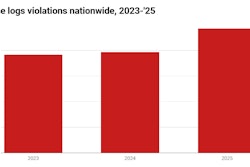 “I just sit here and wait till they get it all sorted out,” says flatbedder Jeremy Johnson.
“I just sit here and wait till they get it all sorted out,” says flatbedder Jeremy Johnson.I recently had the opportunity to join a flatbed owner-operator as he wasted gallons of diesel to cool his parked truck under a brutal sun. Jeremy Johnson, leased to Blair Logistics, of Birmingham, Ala., was waiting to deliver a steel coil. The five-and-half-hour delay was partly a receiver snafu with bills of lading, partly business as usual.
As is the case with many carriers and owner-operators, Johnson says detention pay is spotty. This day, he got none. When he does get it, it usually doesn’t kick in until after four hours.
A recent survey of carriers and brokers in DAT Solutions’ load board network quantifies this sad state of affairs:
- Typical detention times of three to four hours were reported by 54 percent of carrier respondents.
- Common detention of five or more hours was reported by 9 percent of carriers.
- Only 3 percent of carriers were paid on 90 percent or more of their detention claims. The rate was $30 and $50 per hour, which still didn’t cover lost opportunities and other costs. (Overdrive Senior Editor Todd Dills, reporting in depth on detention, has calculated $64 an hour as adequate compensation for the average independent.)
Similar data is also being gathered by the U.S. Department of Transportation Office of Inspector General. It could lead to hours of service changes or a mandate for detention pay. Via highway bill drafts, the Obama administration has twice attempted a mandate for a minimum compensation for all on-duty not-driving time.
 Johnson owns a 2000 Peterbilt 379, his first truck, powered by a 3406E Caterpillar.
Johnson owns a 2000 Peterbilt 379, his first truck, powered by a 3406E Caterpillar.DOT’s audit of dock delays ties in with FAST Act highway bill requirements. Detention’s impact on safety and driver compensation, too, were Congressionally required considerations. The DOT OIG also noted how the lack of flexibility in the 14-hour daily on-duty limitation makes things worse for drivers subjected to unpredictable, prolonged detention.

Near term, there’s no reason to expect the private sector to generate much change. Soft freight demand pressures carriers to play overly nice when it comes to demanding fair – or even any – detention pay.
On the regulatory side, it takes a leap of faith to believe that the same bureaucracy that created the flawed iterations of hours of service regs will use whatever data it gathers to produce meaningful change in detention abuse. At least the issue is being taken seriously, but the regulatory wheels in D.C. turn very slowly, just like the wheels of operation at many docks.
“I just sit here and wait till they get it all sorted out,” Johnson said when he finally figured out the bungled paperwork situation at his drop, learning it would cost him another two or three hours. “Guess who gets screwed in the meantime.”











